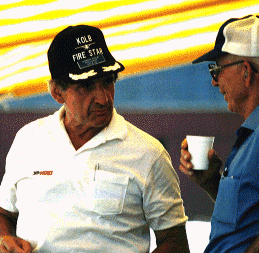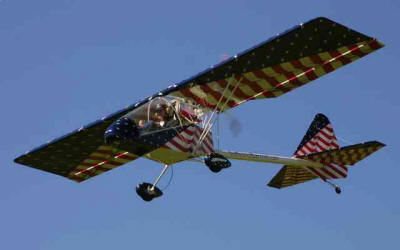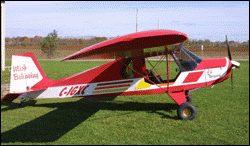|
 When examining the birth of ultralight aviation Moody, Eipper,
Choiota, and Kolb jump out
from the pages of
ultralight history.
While John Moody was probably the first person in North America to strap a motor to his
back and take off under a hang glider. Chiota and Eipper were some of the first to introduce mass production ultralights to the
market. (Weedhopper and Quicksilver)
And while other designers and factories were knocking out "Ripsilver" clones, a
designer and builder in Pennsylvania by the name of Holmer Kolb was busy designing and
building, his own light aircraft designs. When examining the birth of ultralight aviation Moody, Eipper,
Choiota, and Kolb jump out
from the pages of
ultralight history.
While John Moody was probably the first person in North America to strap a motor to his
back and take off under a hang glider. Chiota and Eipper were some of the first to introduce mass production ultralights to the
market. (Weedhopper and Quicksilver)
And while other designers and factories were knocking out "Ripsilver" clones, a
designer and builder in Pennsylvania by the name of Holmer Kolb was busy designing and
building, his own light aircraft designs.
Over the 20 years that I have been covering the ultralight scene I have run into
Homer Kolb many times. In fact even before meeting the man his name was familiar to me
because of the product he produces.
As a reporter at events such as Lakeland and Oshkosh, part of the task at hand is to let
the world at large know who has introduced this, or improved that, or won such and such an
award.
It seems that as long as I have been reporting one or another of
Holmer's designs have been
winning awards. It wasn't until Oshkosh 88 that I was formally introduced to
Holmer.
Oh we
had met from time to time and he would stop and chat for a while. These were more like two
people meeting who have briefly crossed paths, a brief period of recognition, nothing
more. Then in 89 at Oshkosh Angel Matos owner of Advanced Aviation, introduced me to Holmer and
Lyle Byrun of Eipper. Here I was a little bald headed Canadian sitting between two of the
legends in ultralight aviation.
For close to two hours I sat riveted to my seat listening as Holmer, Lyle, Angel, Wayne
Richter, and Jan Swager recounted passages
from their memories of the hey day of
ultralight aviation.
It was nearly 7 months later after discussion with Scott Wilcox, general manager of
Ultralight Flying that I decided to go back into the past of ultralight aviation and find
out just who these men were that were designing and building the planes that I was flying.
Why do they do what they do?
Where do they get their ideas from?
Why does one build from this kind of material, while another form something else?
Why have some been so successful, while others fail?
Why have some of the successful ones gone onto failure?
Holmer Kolb
Let' s take a look at Holmer Kolb, one of the founders of the ultralight movement in North
America.
But how does a man who describes himself as "an amateur designer, nothing more",
get involved in designing and building some of the most award winning aircraft on the
ultralight market?
According to Holmer,"It all started as a kid, when I would collect cereal box tops,
and send them away for those little wind up model airplanes".
"Then when I was 12 years of age, I designed a little boat that went like the
dickens, I used the money from the sale of the boats to get the money to build little
aeroplanes"
"The first planes had wooden wings with aluminum tubing making up the fuselage and
tail sections, these were quite light, and were pulled aloft by boats"
"It has always been a dream of mine to be able to design, build and fly a craft that
weighted less than the pilot" "When Rogollo, came out with his Delta wing
design, I read all the reports, did extensive studying into airfoils, and built a scaled
up kite from his data".
"This kite flew for close to ten years, it used weight shift
for control and
was towed up behind a motor boat"
So when did you first put an engine on one of your designs?
"I think it was in the
early 1960s when engines like the McCullough Chain saw, and Chrysler west bend became
available" "I have always been fascinated with multiple engine aircraft, so one of my first
powered designs was an all metal, aluminum skin aircraft, riveted together, and powered by
4 weed eater engines "
"This craft was FAA inspected, it had a short wing, low aspect ratio, and is still up
in my barn, back in Pennsylvania." "I think it was in 1965 that I built
N2H","she was an all metal aircraft, with 1/4 " thick honeycomb, over .008
aluminum, glued to balsam wood and featured a hinged wing, with 4 engines"
Is N2H still flying?
"I don't know, N2H was sold to a gambling house owner, and the money was put back
into building more aeroplanes"
What happened after N2H?
 "From 1966 to 70 I played around with the Flyer" "The Flyer was designed to
be powered by two engines, yet provide slow speed flight, and be light enough to foot
launch," "From 1966 to 70 I played around with the Flyer" "The Flyer was designed to
be powered by two engines, yet provide slow speed flight, and be light enough to foot
launch,"
Did the Flyer live up to your expectations?
"The first Flyer was a little crude but flew well, and was covered with mylar and rip
stop dacrpm."
"From 1971 to 78 I didn't do much, then in 79 I got back into it again". "I
changed the engines and fabric and came to Oshkosh with a 10 year old aircraft, in a
trailer"
How was the reception at Oshkosh?
"The Flyer was received well but because of the tornado like winds we couldn't do
much flying."
"Where the Flyer really took off though was in Tulahoma Tennessee." " A
local EAA chapter put on quite an impressive show, these were real nice people, although a
little hesitant at first they allowed me to fly from the grass strip"
"The Flyer showed good control in the light winds and proved several times that it
could land without an engine", "There was a lot of interest, and I sold quite a
few plans"
"The Ultrastar evolved from the Flyer, but was powered by the new Cayuna engine, that
Jack McCormack was using on the Pterodactyl"
Were you still selling plans at this time?
"I had to stop selling plans because I was terrified by what some of the builders
were doing, when it came to the choice of materials"
How many Ultrastar kits were sold then?
"Altogether I think that between 400 and 500 Ultrastar kits were sold."
After the Ultrastar you came out with several new designs using some of the same
principles why?
"The Ultrastar had a few problems, the major one being that wood doesn't cut grass
well, as many owners found out when they taxied into long grass" "Noise
was another problem, as was being out in the open" "These problems were solved
by the introduction of the Firestar which was introduced at Lakeland in 1989."
"The Firestar is a very docile craft, in fact you can keep the wings level right
through stall." "It has good visibility, and with its folding wings can be put
into a garage for easy storage."
"The 377 Rotax engine is mounted behind the pilot and above the wing, which cuts down
on the noise, and eliminates the prop clearance problem."
"The 35 hp Rotax engine provides a very good climb rate." 
Why folding wings?
"In the early days I saw all the old Easy Risers left out in the rain and snow, it
was a real shame, the folding wings allow for easy storage and contributes to
safety."
I notice that one of your craft is featured in the Full Lotus brochure!
"Yes the Firestar has recently been mounted on Full Lotus floats and we have been
very pleased with the performance."
What about the Mark11?
"The Mark11 is powered by the 503 Rotax engine, features side by side seating, is
enclosed, and has an exceptional climb rate for a two seat aircraft"
"We also build the Twin star" "It is a two place trainer with side by side
seating, and is also powered by the 503 Rotax engine."
I have been very impressed by the performance of both the Firestar powered by the
377 Rotax and the Mark 11 with the 503!
Any plans on using the 582 liquid cooled engine?
"We have found the 503 to be a good reliable engine, probably the most reliable of
the Rotax engines, with the performance we are currently getting I don't really see it
being necessary."
Any plans for new designs in the future?
"Oh we've got a few projects in the works, once we get time to get to them."
Anything for introduction at Oshkosh?
"Oh we might have something in the works, only time will tell!"
Wrap up
I have been on the ultralight scene for over to 20 years now. Have seen many dealers and
manufactures go from rags to riches and back again. Have listened as designers spew forth
words to describe their craft that you would need a Webster's dictionary to understand.
None of these describe the man or products in the above story. Holmer Kolb took time off
from a very hectic show at Lakeland to sit down, and talk to someone he had only briefly
been introduced to several years before.
He talked to me not unlike a father and son discussing a piece of history that they had
both shared together. No 14 syllable words were used. No exaggerated claims. No sales
pitch. No "me and my aircraft are the greatest thing since sliced bread".
In his mind Holmer Kolb is exactly what he claims to be "just an amateur designer,
nothing more", but to an industry that has suffered through famine and feast, been
racked by unfilled orders and exaggerated claims, he and his products are the yardstick
that others in the industry can be measured against.
U.B. Judge |


 When examining the birth of ultralight aviation Moody, Eipper,
Choiota, and Kolb jump out
from the pages of
ultralight history.
While John Moody was probably the first person in North America to strap a motor to his
back and take off under a hang glider. Chiota and Eipper were some of the first to introduce mass production ultralights to the
market. (Weedhopper and Quicksilver)
And while other designers and factories were knocking out "Ripsilver" clones, a
designer and builder in Pennsylvania by the name of Holmer Kolb was busy designing and
building, his own light aircraft designs.
When examining the birth of ultralight aviation Moody, Eipper,
Choiota, and Kolb jump out
from the pages of
ultralight history.
While John Moody was probably the first person in North America to strap a motor to his
back and take off under a hang glider. Chiota and Eipper were some of the first to introduce mass production ultralights to the
market. (Weedhopper and Quicksilver)
And while other designers and factories were knocking out "Ripsilver" clones, a
designer and builder in Pennsylvania by the name of Holmer Kolb was busy designing and
building, his own light aircraft designs.